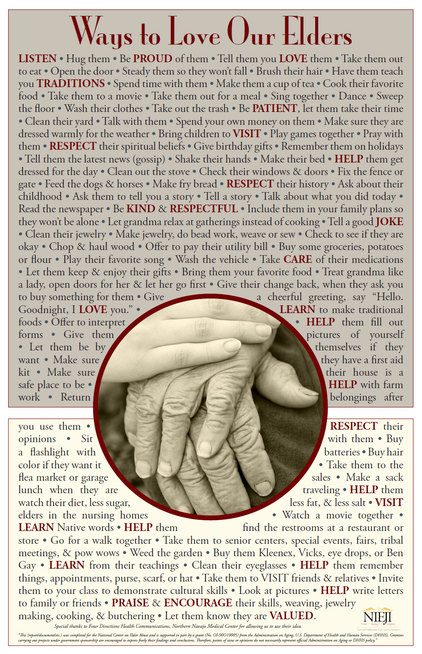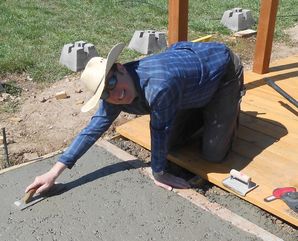 In our last newsletter, we highlighted Red Feather’s recent efforts to help elders live their remaining years in their own homes. The project is enabled thanks to a strong partnership we have with Dr Lisa Jane Hardy and her department at Northern Arizona Univertisty, the Center for American Indian Resilience. We are working together with the Hopi Office of Aging and Adult Services, Village Elder Programs, and interested community members to deliver a pilot of the program across Hopi. Funding was provided through a grant we won from Kendal Charitable Foundation. We are very honored and grateful to have been selected out of nearly 100 applicants for this grant. Our objectives for this pilot are to develop a training that teaches those taking care of elders how to assess homes for aging in place needs and instruct occupants on how to remedy basic problems. After the training, 24 households will receive comprehensive assessments along with $250 to spend on do-it-yourself home interventions, such as mobility and bathroom accessibility enhancements, or measures to improve indoor air quality. Families will also be provided with a series of educational resources that empower them to create healthier living environments. Red Feather plans to leverage our Native Home Resource Network for households that have repairs that go beyond DIY interventions and/or lack the resources to manage their own home repairs. Red Feather believes that community engagement is critical to developing effective programs. In a recent listening session with over 70 Hopi elders we asked about the most pressing housing needs they have that inhibit their ability to age in place. We also asked them to list things that help them to be happy and well in their homes. A few of the highlights from this discussion included: When elders think about the challenges they face they consider structural needs like accessible bathing and mobility ramps in addition to major repair needs like leaking roofs, mold remediation or stove replacement. Bathing can be difficult for all elders, but even more so for those living without running water or electricity in their homes. Walk-in showers, tall toilets, plumbing, grab bars, etc. are needed at public bathing facilities to provide increased independence and safety. Many elders talked about the social aspects of their lives, like having friends and family come to visit, being even more important to aging in place than improvements to the home environment.  With an over 20 -year history of helping people help themselves, Red Feather has seen difficult times and has always overcome them. We have been able to sustain our programs by listening carefully to the communities we serve and leveraging the wisdom of our large family of donors, partners, board members and advisors. A new challenge presented itself when our recent annual appeal earned only half of what we were expecting. To determine our path forward, four Red Feather board members, the five Red Feather staff members, and a seasoned facilitator came together. Through those conversations, we collectively concluded that our existing assets and expected income would not support our current operating structure, and that changes were necessary to ensure the survival of the organization. Consequently, the Board and I decided to suspend operations in Montana where we have been working with the Northern Cheyenne Tribe, until funding conditions are more favorable. In agriculture, there are times when planting fewer crops is necessary to save seeds for more favorable growing conditions. A similar principle applies in organizational management – difficult prioritization decisions are often required to ensure a healthy future. It is very difficult to discontinue our programs serving the Northern Cheyenne people, and to lose a valuable member of the Red Feather team in John Marian, but we felt strongly that this was the best way to ensure our programs endure to help others, and to hasten our return to Montana. John Marian has served as Red Feather’s Education Director and Northern Plains Program Manager since 2014. He originally joined the organization in 2012 as a part-time temporary employee, hired specifically to develop our first educational curriculum, a Basic Home Maintenance college course which he successfully delivered at Chief Dull Knife College in 2013. Since that time, John has been responsible for creating all of Red Feather’s highly successful Do-It-Yourself educational programs, empowering Native Americans to address their most urgent housing needs. In addition, John has developed and delivered several other important programs with and for the Northern Cheyenne people; such as healthy home maintenance workshops for low-rent tenants, a building performance study which included several Red Feather straw bale homes and led to a major home renovation project for Northern Cheyenne elder and veteran Bilford Curley, and, most recently, a volunteer-driven Weatherization Blitz. While difficult to part ways with John, we are grateful for the time and devotion he gave to the Northern Cheyenne people and to Red Feather, and expect great things from whatever he undertakes next. We ask the Northern Cheyenne people, and all of our supporters and followers, to please be patient. We must strengthen ourselves before helping others. By focusing our remaining resources on the programs we offer to the Navajo Nation and Hopi Tribe we will grow strong enough to return to plant the seeds we have set aside. We will continue to maintain a smaller office and storage in Bozeman, and thankfully retain our Office Manager, Delisa de Vargas and our VISTA worker Ellary Kramka. We remember the Northern Cheyenne and are grateful for the faith they have shown us and the opportunities they have provided for us to become better people. It is with this in mind, that we store the seeds that will allow us to return our programs to the Northern Cheyenne people. |
Archives
June 2023
Categories
All
|
|
Change your mind at any time by clicking 'unsubscribe' in any email you receive or by contacting us at info@redfeather.org. We will treat your information with respect. For more information about our privacy practices please see our privacy policy. By clicking above, you agree that we may process your information in accordance with these terms.
In compliance with all GDPR requirements- you can request any data you’ve shared with Red Feather to be permanently deleted from our records by contacting us at info@redfeather.org. |
WORKING WITH HOPI AND DINÉ
COMMUNITIES FOR HEALTHIER AND SAFER HOMES.
LAND ACKNOWLEDGEMENT: The Red Feather program office sits in an area that is sacred to over 14 local tribes, including the Diné, Hopi, Havasupai, Hualapai, Zuni, Pueblo, and Kaibab-Paiute peoples. Some of these nations are represented among the Red Feather staff, and some not. We humbly acknowledge this area’s Indigenous nations, original stewards and Native descendants who will forever know this place as home. We share a responsibility to recognize and acknowledge the people, cultures, and histories that make up our community. *Adapted from the Flagstaff City Council land acknowledgement developed by the Indigenous Commission

If you have a disability that limits your ability to access our facilities, please contact us so we can arrange for an alternative meeting location. See our ADA access plan here.
This institution is an equal opportunity provider. |


 RSS Feed
RSS Feed


